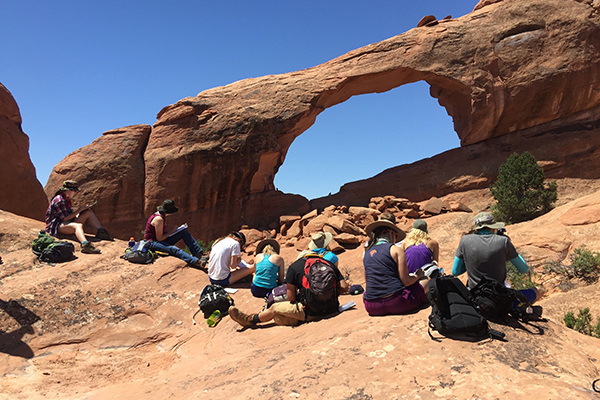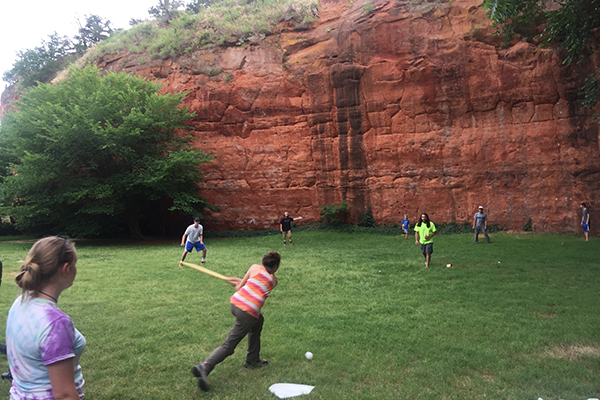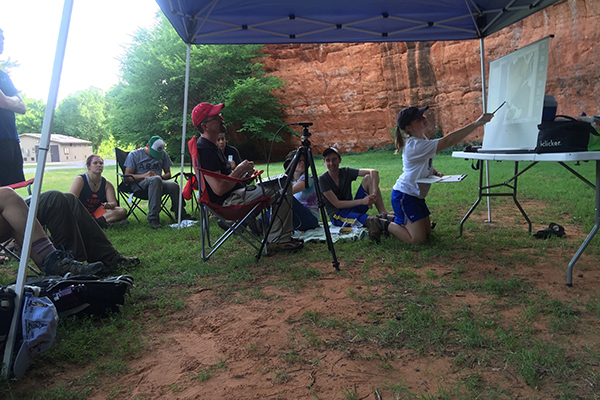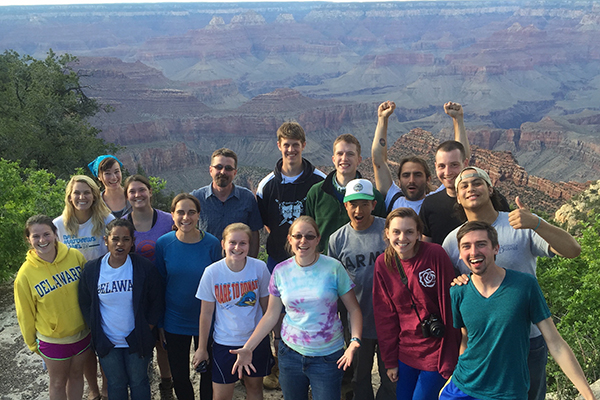Geological adventure
UD students explore 19 states, geological wonders of American West in field course
10:12 a.m., Aug. 13, 2015--Sixteen students in the University of Delaware’s College of Earth, Ocean, and Environment (CEOE) and College of Engineering recently took the ultimate summer road trip through the American West.
Field course Geology 306 took the phrase “field trip” to the next level as students traversed 19 states and 6,500 miles over four weeks, experiencing America’s natural wonders and reading the lines in the sand that tell the country’s geological past.
Campus Stories
From graduates, faculty
Doctoral hooding
Led by Michael O’Neal, associate professor of geology, the caravan camped for four to five days in each location, with stops including the Grand Canyon, the Badlands, Yellowstone and Arches National Park.
Students ate, slept, studied, explored and even played Wiffle ball in front of several million-year-old structures together.
“The students basically didn’t see the inside of a building for four weeks,” said O’Neal, who also coordinated the trip.
Through coursework, they analyzed geological landmarks, deciphering history from the formations, incisions and deposits found in layers of rock that indicate things like ancient rivers or tectonic movements.
Students sharpened their technical skills using field tools like global positioning systems, measuring tapes and the Brunton Compass, with which they determined 3-D positioning in landscapes. They also practiced recording accurate field notes and strengthened their knowledge of geological principles like spatial reasoning and thinking along geologic time scales.
When asked what geological tool students employed most, O’Neal replied, “Their eyes. One of the biggest parts of geology is learning how to see, identify and interpret. In this course, students train for a career in geology, where they could be dumped in a location and told, ‘Here, make a map. Interpret what happened here.’”
Jennifer Schoenstein, a UD senior double majoring in environmental science and geology, recalled sitting on a rocky overlook in Arizona, sketching a geological map. “I just kept thinking, ‘Wow, we are so lucky to be having class on the edge of the Grand Canyon,’” she said. “There's no better way for a geologist to learn!”
This summer in its fifth year, the course had a new addition; an Information Technology Transformation Grant from the University allowed for an outdoor classroom including a portable screen and projector, pop-up tent, computer and rechargeable batteries. Students benefited from PowerPoint presentations, video clips and even i>clicker access that supplemented field work.
In addition to the course’s academic rigor, teaching assistant and CEOE graduate student Coty Cribb said the experience was one of individual and community growth.
“My favorite part of the trip was the engaging conversation that happened on the long car rides,” Cribb said. “After about a week, you forget the day of the week, and to check your email — the stress of the last semester melts away and you’re able to truly live in the moment.”
O’Neal added that the combination of camaraderie, self-discovery and academic growth forms a lasting experience, evidenced by the substantial alumni contributions toward funding the program.
“Comparable programs at other institutions can cost students thousands of dollars,” said O’Neal. “At UD, support from alumni and the Department of Geological Sciences allows us to make this unique opportunity accessible for the cost of tuition and about $300 for food.”
The Geology 306 course is open to undergraduates with the proper pre-requisites, regardless of major. Next summer, the trip will also include a general geological sciences course to accommodate growing student interest.
In the future, O’Neal said he hopes to make the program accessible to students from other universities without the same capabilities, or to partner with schools in underprivileged areas.
Article by Caren Fitzgerald














